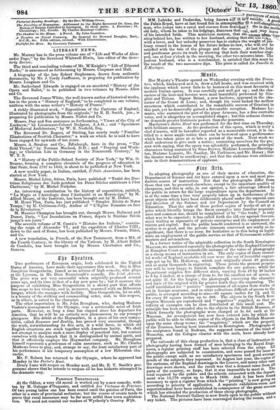ODOE itYrflingt Two performers of European origin, both celebrated in
the United States of America, have made their appearance this week. One is Miss Josephine Gougenheim, famed as an actress of high comedy, who plays at the Lyceum, in Mr. Dion Bourcicault's comedy, The _Trish Actress. The piece was not very successful when originally produced several years ago, and its time is that of a day now gone by but it answers the purpose of exhibiting Miss Gougenheim in a showy part that affords free scope to her vivacity, and is, moreover, seasoned with an Hibernian brogue, which she manages with facility. Miss Gougenheim, let us add, is a beauty of the striking and commanding order, and, in this respect, as in others, is suited to the character.
The other importation is Mr. John Brougham, who, during Madame Vestris's management of the Olympic, was a serviceable actor of Irish parts. However, so long a time has elapsed since his departure for America, that he will be an entirely new phenomenon to our younger playgoers. His debtlt at the Haymarket, in a piece of his own compo- sition, called .Romanee and .Reality, has proved very successful, though the work, notwithstanding its five acts, is a wild farce, in which old English situations are stuck together with American laxity. We shall not attempt to analyze such a mere display of practical fun, but content ourselves with the remark that it is distinguished by animal spirit, and that it effectively employs the Haymarket company. Mr. Brougham himself represents a gentleman of calm assurance, such as Mr. Charles Mathews loves to play, and, strange to say, the least satisfactory part of his performance is his temporary assumption of a low Hibernian cha- racter.
Mr. F. Robson has returned to the Olympic, where he appeared last Monday in the Porter's Knot. Drury Lane will reopen on Monday next, and Mr. E. T. Smith's pro- gramme shows that he intends to surpass all he has hitherto attempted in the dramatic way.


























 Previous page
Previous page